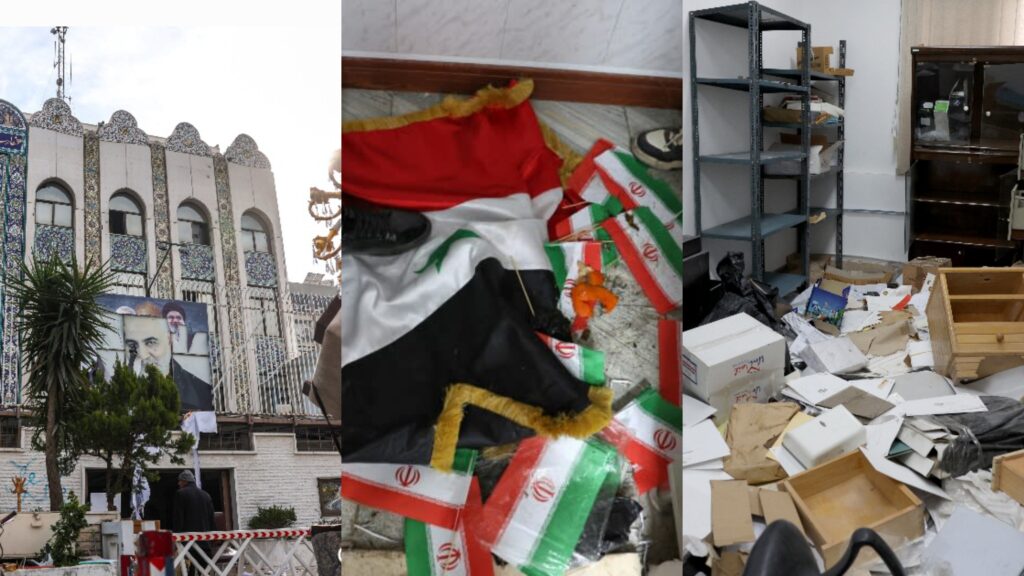
Syria’s fate is the sole responsibility of the Syrian people and should be pursued without foreign imposition or intervention, Iran’s foreign ministry said on Sunday, after Tehran’s ally Bashar al-Assad was toppled by rebels.
Iran’s embassy in Syria was vandalised on Sunday, an AFP photographer said after Islamist-led rebels declared the fall of Tehran ally Bashar al-Assad following a sweeping offensive that culminated in Damascus.
The AFP photographer saw ransacked offices, with shattered glass on the floor and broken furniture in the building in Damascus’s upscale Mazzeh area, also home to other embassies and United Nations offices.
People loaded looted items onto trucks outside, the photographer said.
Filing cabinets and drawers sat open while papers, files and other contents, including Iranian and Syrian flags, were strewn around the premises.
A safe sat in the middle of one room, whose tiled floor was littered with broken posters including of the Islamic republic’s founder Ayatollah Ruhollah Khomeini and current supreme leader Ayatollah Ali Khamenei, the AFP photographer saw.
Also on the ground was a destroyed picture of Lebanon’s former Hezbollah chief Hassan Nasrallah, killed in an Israeli strike in Beirut’s southern suburbs in September, and of Iranian Revolutionary Guards commander Qasem Soleimani, who died in a US drone strike in the Iraqi capital Baghdad in January 2020.
“Unknown individuals have attacked the Iranian embassy, as you can see in these images shared by various networks,” an Iranian state television broadcaster said, showing footage from Al Arabiya, said to be from the diplomatic compound.
Iranian newspaper Tehran Times reported online that Iranian diplomats had left the embassy before it was stormed, citing foreign ministry spokesman Esmaeil Baqaei.
The report accused rebel forces of being behind the attack, a claim that could not be independently verified immediately.
Later Sunday, Baqaei said in a statement that Tehran has taken the “necessary measures” to ensure the “security and safety of the employees of the embassy”.
He added that “the ambassador and employees are in perfect health”.
Online footage verified by AFP showed men outside the embassy overnight, tearing down a poster showing Nasrallah and Soleimani.
Iranian state TV reported that Hayat Tahrir al-Sham (HTS), which spearheaded the rebel advances across western Syria, had guaranteed that the sanctity of Shi’ite shrines in Syria would be preserved.
Iran’s semi-official Tasnim news agency said on Sunday that all Iranian servants of the Sayeda Zeinab shrine returned to Iran prior to the capture of Damascus by rebels.
Sayeda Zeinab – the granddaughter of the Prophet Mohammad – is venerated by Shi’ites and her shrine is a site of mass pilgrimage for Shi’ites from across the world. It has also been a magnet for Shi’ite militiamen backed by Iran in Syria.
On Saturday, as the rebels pressed their lightning offensive but had not yet taken Damascus, Iran’s Foreign Minister Abbas Araghchi called on “the Syrian government and legitimate opposition groups” to enter negotiations.
“We will spare no effort to help establish security and stability in Syria, and to this end, we will continue consultations with all influential parties, especially in the region,” the foreign ministry said.
The foreign ministry said it expected ties between Tehran and Damascus to continue based on the two countries’ “far-sighted and wise approach.”
The foreign ministry said it expected ties between Tehran and Damascus to continue based on the two countries’ “far-sighted and wise approach.”
Araghchi visited Damascus on December 1, days into the rebel offensive, meeting with Assad in the Syrian leader’s last public appearance alongside an Iranian official.
A day later, Iranian President Masoud Pezeshkian reiterated Tehran’s support in a telephone call with Assad.
The deposed Syrian leader last visited Iran in May, shortly after the death of former president Ebrahim Raisi in a helicopter crash.
Iran’s arch-rival in the region, Israeli Prime Minister Benyamin Netanyahu, said Assad’s ousting was a “historic day” and a direct result of blows dealt by Israel to Iran and Lebanon’s Hezbollah, which had been Assad’s staunchest allies.
Iran spent billions of dollars propping up Assad during the Syrian civil war that erupted in 2011 and deployed its Revolutionary Guards to Syria to keep its ally in power so as to maintain Tehran’s “Axis of Resistance” to Israel and U.S. influence in the Middle East.
Numerous Iranian Revolutionary Guards commanders have been killed in Syria, in combat and in Israeli strikes.
Source (s): AFP, Reuters
Follow the KOIKIMEDIA NEWS 🗞️ CHANNEL on WhatsApp: https://whatsapp.com/channel/0029VatGuwaGufJ1s73IEk0N
